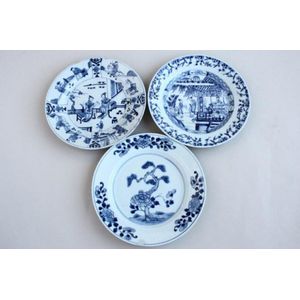Chinoiserie Pearlware Chestnut Baskets, C1800
You must be a subscriber, and be logged in to view price and dealer details.
Subscribe Now to view actual auction price for this item
When you subscribe, you have the option of setting the currency in which to display prices to $Au, $US, $NZ or Stg.
- Chinoiserie - Furniture and decorative items decorated in imitation of a Western interpretation of the Chinese style. The Chinoiserie style first became popular in the late 17th century, though there were frequent revivals, notably by Chippendale (hence 'Chinese Chippendale') during the Regency period, and the Anglo-Japanese style in the second half of the 19th century.
The ubiquitous 'willow pattern' is the most common 'Chinese' theme used in porcelain, while on furniture the Chinoiserie style usually has black or red painted and lacquered decoration, though the hallmark of the furniture style is the use of fretwork in geometrical patterns, pagodas and other decorative forms.
Japonaiseries, as the name implies, are motifs in imitation of the Japanese taste.
See also "Chinese Chippendale". - Pearlware - Pearlware is a type of earthenware pottery that was developed in the late 18th century in England, made from a mixture of clay, flint, and other materials, and is distinguished by its smooth, creamy white glaze. The glaze has a pearlescent quality, which is how the pottery got its name.
Pearlware was developed as a more affordable alternative to porcelain, which was much more expensive and difficult to produce. It quickly became popular throughout England and Europe, and was exported to other parts of the world as well. It was particularly popular for making tableware, such as plates, bowls, and teapots, as well as decorative objects like figurines and vases.
One of the most distinctive features of pearlware is its blue decoration. Many pieces of pearlware were decorated with blue patterns or designs, often featuring pastoral scenes, floral motifs, or geometric patterns. The blue decoration was typically applied over the white glaze, which created a striking contrast and made the designs stand out.
This item has been included into following indexes:
Visually similar items

Three Chinese Qing Dynasty blue and white porcelain plates, one of octagonal form decorated with house and lake scene, one decorated with house scene, one decorated with flowers and foliage accented with gilt, a/f, diameter 23 cm, 23.5 cm, 23 cm, (3)

Seven 19th century pearlware plates, 17.9 cm - 24.3 cm diameter

Three Chinese Qing Dynasty blue and white porcelain plates, one decorated with tree, flowers and foliage, two decorated with figures at work and play, a/f, diameter 23 cm, (3)

Three graduated Chinese Qing Dynasty blue and white porcelain plates, all decorated with village scenes, flowers and foliage, a/f, diameter 28 cm, 24 cm, 19 cm, (3)
